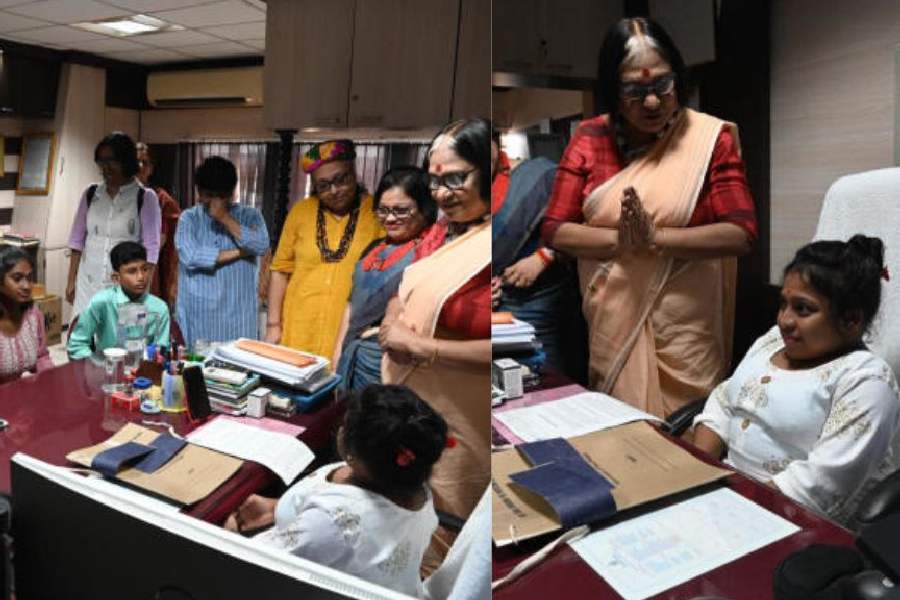Special needs students want inclusion


A group of students with disabilities placed their demands that should be part of their rights but often get ignored in the mainstream because of lack of awareness and sensitivity.
Riya Sardar, a Class VIII special needs student, was the chairperson of the West Bengal Commission for Protection of Child Rights on Monday.
Four others — Anushri Mondal, Sruti Shaw, Kishan Makhal and Swastika Dey — were her team members.
The commission has been observing International Day against Trafficking in Humans on July 30 in such a manner for years.
In the past, a sex worker’s daughter, a trafficking survivor and a transwoman have been chairpersons for a day. Their demands were placed before minister for women and child development and social welfare Shashi Panja.
Riya and her team’s demands were as basic as ramps in schools and offices, accessibility to public transport, help who would understand sign language in hospitals and protection from sexual abuse and child labour.
They also want to be included in the decision-making process that involves changes about them. “Nothing about us, without us,” they said.
The list of their demands will be placed before minister Panja.
“Children who have disabilities are prone to being abused or trafficked. We need to focus special attention on them and make them part of the mainstream by including them in all the fora where their problems are being discussed, evaluated or solutions being sought...WBCPCR always gives credence to
what children are saying as they have every right to speak out about themselves,” the commission said in a press release.
“We are taking this initiative because we want them to be mainstreamed. The students want to be included in the policy-making decisions that involve them,” said Sudeshna Roy, chairperson, West Bengal Commission for Protection of Child Rights.
One of their demands is that they be made more aware of possible sexual offences and the Pocso (Protection of Children from Sexual Offences) law.
Riya said every school must have a ramp with a railing.
Classrooms for students with disabilities should
be on the ground floor and such information should be included in the school manual so teachers are aware of it, she added.
“There are children who communicate through sign language and when admitted to hospitals they have to be dependent on their guardians. There should be help in hospitals who understands the sign language,” Riya said.
Many children with special needs use public transport to commute to school or elsewhere.
“Those who have difficulty walking take longer to board a bus. The bus conductors do not want to wait. The stairs to a bus should be of a lower height which would make access easier,” said Riya.
Anushri said on such occasions they have to take an autorickshaw or any other transport which is an expensive option.
“Buses when they see us do not stop. But they should stop,” said Anushri.
One of the demands is that there should be training in sign language and Braille among teachers in school.
“Like English, mathematics, Hindi there should be Braille. We usually would go to a school which is close to our home. There should be teachers who understand Braille and sign language. There are students and some teachers who underestimate us. But it is wrong and instead of that they should understand us,” said Sruti, who has a visual disability.
The students spoke about their experiences of being ignored or ridiculed in school.
“School programmes or sports should be such where both children with and without disabilities should be included and not one where it is exclusively for those with disabilities,” said Riya.
The demands need to be harped on regularly to make them happen, said a member of the commission.
Chairperson Roy said the commission had decided to include a few pages in Braille in their magazine Hullor.